Latest Posts by royalrhythm - Page 2
Hi! Your blog is wonderful and is so helpful. I was just wondering if you have any tips on writing dialogue.
I wasn’t sure what you were looking for specifically, so I’ll just supply you with links that I think would help you.
10 Tips for Writing Impactful Dialogue
Dialogue Dos and Don'ts
10 Easy Ways to Improve Your Dialogue
WriteWorld: Dialogue
25 Things You Should Know About Dialogue
I might write up a post in dialogue a bit later (I probably will), but right now the biggest piece of advice I can give you is this: make sure your dialogue is realistic.
a massively extended version of ruthlesscalculus’ post
General Tips
Joss Whedon’s Top 10 Writing Tips
Getting Out of Your Comfort Zone
34 Writing Tips that will make you a Better Writer
50 Free resources that will improve your writing skills
5 ways to get out of the comfort zone and become a stronger writer
10 ways to avoid Writing Insecurity
The Writer’s Guide to Overcoming Insecurity
The Difference Between Good Writers and Bad Writers
You’re Not Hemingway - Developing Your Own Style
7 Ways to use Brain Science to Hook Readers and Reel them In
8 Short Story Tips from Kurt Vonnegut
How to Show, Not Tell
5 Essential Story Ingredients
How to Write Fiction that grabs your readers from page one
Why research is important in writing
Make Your Reader Root for Your Main Character
Writing Ergonomics (Staying Comfortable Whilst Writing)
The Importance of Body Language
Character Development
10 days of Character Building
Name Generators
Name Playground
Universal Mary Sue Litmus Test
Seven Common Character Types
Handling a Cast of Thousands Part 1 - Getting To Know Your Characters
Web Resources for Developing Characters
Building Fictional Characters
Fiction Writer’s Character Chart
Character Building Workshop
Tips for Characterization
Character Chart for Fiction Writers
Villains are people too but…
How to Write a Character Bible
Character Development Exercises
All Your Characters Talk the Same - And They’re Not A Hivemind!
Medieval Names Archive
Sympathy Without Saintliness
Family Echo (Family Tree Maker)
Behind The Name
100 Character Development Questions for Writers
Aether’s Character Development Worksheet
The 12 Common Archetypes
Six Types of Courageous Characters
Kazza’s List of Character Secrets - Part 1, Part 2
Creating Believable Characters With Personality
Body Language Cheat Sheet
Creating Fictional Characters Series
Three Ways to Avoid Lazy Character Description
7 Rules for Picking Names for Fictional Characters
Character Development Questionnaire
How to Create Fictional Characters
Character Name Resources
Character Development Template
Character Development Through Hobbies
Character Flaws List
10 Questions for Creating Believable Characters
Ari’s Archetype Series
How to Craft Compelling Characters
List of 200 Character Traits
Writing Characters of the Opposite Sex
Making Your Characters Likable
Do you really know your characters?
Character Development: Virtues
Character Development: Vices
Character Morality Alignment
List of Negative Personality Traits
List of Positive Personality Traits
List of Emotions - Positive
List of Emotions - Negative
Loon’s Character Development Series - Part 1, Part 2, Part 3, Part 4
Phobia List A-L (Part 1), M-Z (Part 2)
30 Day In Depth Character Development Meme
Words for Emotions based on Severity
Eight Bad Characters
High Level Description of the Sixteen Personality Types
Female Characters
How Not to Write Female Characters
Writing Female Characters
How to write empowering female characters
Why I write strong female characters
Red Flags for Female Characters Written by Men
Writing strong female characters
The Female Character Flowchart
Eight Heroine Archetypes
Male Characters
Eight Hero Archetypes
Tips for Specific Characters
Writing A Vampire
Writing Pansexual Characters
Writing Characters on the Police Force
Writing Drunk Characters
Writing A Manipulative Character
Writing A Friends With Benefits Relationship
Writing A Natural Born Leader
Writing A Flirtatious Character
Writing A Nice Character
Fiction Writing Exercises for Creating Villains
Five Traits to Contribute to an Epic Villain
Writing Villains that Rock
Writing British Characters
How To Write A Character With A Baby
On Assassin Characters
Dialogue
It’s Not What They Say…
Top 8 Tips for Writing Dialogue
Speaking of Dialogue
The Great Said Debate
He Said, She Said, Who Said What?
How to Write Dialogue Unique to Your Characters
Writing Dialogue: Go for Realistic, Not Real-Life
Point of View
Establishing The Right Point of View
How to Start Writing in the Third Person
The I Problem
Plot, Conflict, Structure and Outline
Writing A Novel Using the Snowflake Method
Effectively Outlining Your Novel
Conflict and Character Within Story Structure
Outlining Your Plot
Ideas, Plots and Using the Premise Sheets
How To Write A Novel
Creating Conflict and Sustaining Suspense
Plunge Right In…Into Your Story, That Is
Tips for Creating a Compelling Plot
36 (plus one) Dramatic Situations
The Evil Overlord Devises A Plot: Excerpt from Stupid Plot Tricks
Conflict Test
What is Conflict?
Monomyth
The Hero’s Journey: Summary of Steps
Outline Your Novel in Thirty Minutes
Plotting Without Fears
Novel Outlining 101
Writing The Perfect Scene
One-Page Plotting
The Great Swampy Middle
How Can You Know What Belongs In Your Book?
Create A Plot Outline in 8 Easy Steps
How to Organize and Develop Ideas for Your Novel
Create Structure in your novel using index cards
Choosing the best outline method for you
Hatch’s Plot Bank
Setting & Worldbuilding
Magical Word Builder’s Guide
I Love The End Of The World
World Building 101
The Art of Description: Eight Tips to Help Bring Your Settings to Life
Creating the Perfect Setting - Part 1
Creating a Believable World
Setting
Character and Setting Interactions
Maps Workshop - Developing the Fictional World Through Mapping
World Builders Project
How To Create Fantasy Worlds
Creating Fantasy and Science Fiction Worlds
Creativity Boosters* denotes prompts
*Creative Writing Prompts
*Ink Provoking
*Story Starter
*Story Spinner
*Story Kitchen
*Language is a Virus
*The Dabbling Mum
Quick Story Idea Generator
Solve Your Problems By Simply Saying Them Out Loud
Busting Your Writing Rut
Creative Acceleration: 11 Tips To Engineer A Productive Flow
Writing Inspiration, Or Sex on a Bicycle
The Seven Major Beginner Mistakes
Complete Your First Book with these 9 Simple Writing Habits
Free Association, Active Imagination, Twilight Imaging
Random Book Title Generator
Finishing Your Novel
Story Starters & Idea Generators
Words to Use More Often
Revision & Grammar
How To Rewrite
Editing Recipe
Cliche Finder
Revising Your Novel: Read What You’ve Written
Writing 101: Revising A Novel
20 Common Grammar Mistakes That (Almost) Everyone Makes
Synonyms for the Most Commonly Used Words of the English Language
Grammar Urban Legends
Tools & Software
Tip Of My Tongue - Find the word you’re looking for
Write or Die - Stay motivated
Stay Focused - Tool for Chrome, lock yourself out of distracting websites
My Writing Nook - Online Text Editor, Free
Bubbl.us - Online Mind Map Application, Free
Family Echo - Online Family Tree Maker, Free
Freemind - Mind Map Application; Free; Windows, Mac, Linux, Portable
Xmind - Mind Map Application; Free; Windows, Mac, Linux, Portable
Liquid Story Binder - Novel Organization and Writing Application; free trial, $45.95; Windows, Portable
Scrivener - Novel Organization and Writing Application; free trial, $39.95; Mac
SuperNotecard - Novel Organization and Writing Application; free trial, $29; Windows, Mac, Linux, portable
yWriter - Novel Organization and Writing Application; free; Windows, Linux, portable
JDarkRoom - Minimalist Text Editing Application; free; Windows, Mac, Linux, portable
AutoRealm - Map Creation Application; free; Windows, Linux with Wine
Specific Help
Fashion Terminology
All About Kissing
Genre Help: Romance
187 Mental Illnesses
Types of Mental Illness
Eye Color List
Spectral Groupings
Hello :) Just to say that I am loving your writers page, it's helping me out so much with my character profiling! I wondered; do you have any posts on how to describe someone's gait / walk ?
Here is a list of some that I found in a quick search. If anyone would like to add on, please send in a message or reply to this post!
· amble: to walk leisurely
· careen: pitching dangerously to one side
· falter: move hesitatingly, as if about to give way
· flounder: walk with great difficulty
· footing (n): a firm position for your feet on a surface, especially one that is difficult to stand on or walk across
· in/into step: if people walk in step, each person moves their feet at exactly the same time as the others
· limp (n): a way of walking that is affected by an injured leg or foot
· lumbering (adj): walking slowly because of being large and heavy (or sometimes even just drunk); moving heavily or clumsily
· lurch: walk as if unable to control one’s movements
· meander: to move or cause to move in a sinuous, spiral, or circular course
· on foot: walking
· out of step: if people walk out of step, they do not keep their feet moving at the same time as the rest of a group
· pace (n): a step that you take when you walk or run (fast-paced or slow-paced can be used with this term)
· parade: march in a procession; to walk around with an air of over-confidence
· prowl: move about in or as if in a predatory manner
· ramble: move about aimlessly or without any destination, often in search of food or employment
· rolling (adj): someone who has a rolling walk moves their body from side to side as they walk
· saunter: walk leisurely and with no apparent aim
· shuffle (n): a slow, noisy way of walking
· skulk: move stealthily
· somnambulate: walk in one’s sleep
· springy (adj): if you walk with a springy step, you walk quickly and with a lot of energy
· stagger (n): a way of walking in which you stagger
· stalk: walk stiffly
· stride (n): a long, confident step
· stroll: walk with no apparent aim; walk calm and relaxed
· strut (n): a proud and confident way of walking
· stumble (n): often when someone trips over something, including their own feet; can occur when nervous
· sure-footed (adj): good at walking or climbing and unlikely to fall
· totter: move without being stable, as if threatening to fall
· trudge: walk heavily and firmly, as when weary, or through mud
· waddle: walk unsteadily
· wade: walk through relatively shallow water
20 Basic Plots
These basic plots are from the Tennessee Screenwriting Association, but I thought it would be useful to share them with you all. Many writers believe that there are only so many “basic plots” that make up a story, 20 of them to be exact, and that it all depends on how you develop these plots. This is the same idea that there are only so many story arcs, and that all of our stories fit into a certain category. This is not to say you can’t create something that is uniquely yours, because you can mess with these elements, but when cut something down to the bare bones—nothing is really original. These recognizable story forms work and that’s why they’re used over and over again. Here are the 20 basic plots—
1. QUEST – the protagonist is searching for something (person, place, thing, or idea) and is on a journey to find it.
2. ADVENTURE – the protagonist searches for their fortune, but has to leave home to do it.
3. PURSUIT - hide-and-seek plot, one group or person chasing another.
4. RESCUE - the protagonist is searching for someone or something that needs to be saved—this usually involves protagonist, victim, and antagonist.
5. ESCAPE – the protagonist wants to escape some sort of situation, on a quest to get away.
6. REVENGE - retaliation against someone else for wrong-doings.
7. THE RIDDLE - the protagonist’s search to find the hidden meaning of something.
8. RIVALRY - the protagonist is competing for same object or goal as another person.
9. UNDERDOG – the protagonist has a great disadvantage and faces overwhelming odds while trying to reach his or her goals.
10. TEMPTATION – the protagonist is tempted into doing something that is unwise, wrong or immoral.
11. METAMORPHOSIS - the physical characteristics of the protagonist actually changes from one form to another.
12. TRANSFORMATION - the protagonist journeys through a stage of life that moves them from one significant character state to another.
13. MATURATION - the protagonist faces a problem that causes them to learn from it and mature into adulthood.
14. LOVE - the protagonist overcomes the obstacles that prevent him or her from engaging in true love.
15. FORBIDDEN LOVE – the protagonist overcomes obstacles that prevent him or her from true love, but sometimes find the outcome too high a price to live with.
16. SACRIFICE - the protagonist is motivated by a higher purpose such as love, honor, and charity or for the sake of humanity.
17. DISCOVERY - the protagonist, having to overcome a life-changing event, discovers a deeper meaning of life that changes their outlook.
18. WRETCHED EXCESS - the protagonist pushes the limits of acceptable behavior to the extreme and is forced to deal with the consequences.
19. ASCENSION – this rags-to-riches plot deals with the rise of the protagonist due to a dominating character trait that helps them to succeed.
20. DECISION – this riches-to-rags plot deals with the fall of the protagonist due to dominating character trait that eventually destroys their success.
It’s easy to see that some stories can fit into a few of these categories and you can build your story up around several of these basic plots. Generally, a story will fit into one category more than another. There are many references on basic plots, and not all writers have the same opinions on it, so it helps to research them yourself. I just thought this might give you a little motivation or help you structure your story better.
-Kris Noel

HEY WRITER FRIENDS
there’s this amazing site called realtimeboardwhich is like a whiteboard where you can plan and draw webs and family trees and timelines and all that sort of stuff. you can also insert videos, documents, photos, and lots of other things. you can put notes and post-its and, best of all, you can invite other people to be on the board with you and edit together!!
this is really really awesome and a great tool for novel planning, so if you’re doing nanowrimo…. this could be good for you!!

The Five Stages of Decomposition
Found a little summary of human decomposition primarily used for writing, but an interesting read for everyone else.
Following death, the human body progresses through five basic stages of decomposition. The duration and degree of each stage is largely influenced by the environment (temperature, humidity, etc.), body mass, any wrappings or coverings of the body, and obviously scavenging or other post-mortem disturbances. Additionally, submerged or buried bodies will decompose much differently than bodies left on the ground. This is what I will be referring to below. Here are the general descriptions of the five stages of decomposition:
Fresh
The fresh stage begins immediately after death when the circulatory system (heart beating/pumping blood) stops functioning. It is during this stage that the blood will settle with gravity creating a condition known as lividity. After several hours the muscles will also begin to stiffen in a process known as rigor mortis. The body temperature will also begin to acclimate to the environment. Cells will begin to break down and release enzymes during a process called autolysis which can cause blisters on the skin. The anaerobic organisms in the digestive tract will begin to multiply, producing acids and gases (the source of the bad odors). This process is often referred to as putrefaction.
Bloat
As the name implies, the gases being produced during putrefaction begin to build and will give the body a distended appearance. Gases and fluid will eventually escape through the natural orifices as the pressure builds. As the gastrointestinal bacteria multiply and can lead to conditions like marbling which is a discoloration pattern seen in the skin. You may also see green discoloration in the abdomen areas and eventually a darkening (blackish) coloring of the skin overall as the process advances. Interestingly enough; I remember one time I was giving a lecture on forensic entomology at a college campus and after the lecture a serious looking young black student approached me. She asked me why I only showed pictures of black victims in my presentation. I was a bit taken back and briefly confused as I ran through a mental recap of the cases I presented. I finally told her that all of the victims were in fact white (Caucasian) in life but due to this process their skin darkened. It was an eye-opening experience and I made sure to describe this process more effectively when lecturing the public.
Active Decay
During his phase the body begins to lose much of it’s fluids and mass (tissue) through purge and insect and/or vertebrate scavenging (coyote, fox, lion, etc). During this phase you may see very large maggot masses and notice a considerable increase in foul odors.
Advanced Decay
This phase is the end of the active decay process. Temperatures can either speed up (heat) or slow down (cold) how quickly a body reaches this phase. The body has very little body mass and soil staining of the surrounding soils is still evident. This soil staining (from body fluids) may actually kill some of the surrounding vegetation temporarily. Maggots will migrate away from the body to pupate and flies will cease laying eggs.
Dry/Skeletal
This phase is the last measurable stage of decomposition. The timing of this stage varies widely by environment. For example, a body in Florida in July (hot/humid) may reach this stage in a week while in the Winter in the Rocky Mountains (cold/arid) it might take months. If there is any skin left it will be leather-like and very tough. Mostly the body is reduced to bones and connective tissue. There is no biomass available for diverse insect colonization. Some beetles and adventitious insects may colonize a body for shelter or feeding on other insects and connective tissue. Over time the bones may “bleach” (turn white) with exposure to sunlight and eventually will begin to exhibit cracks after several years. These weathering cracks are distinctive and would not be confused with a fresh break (injury) unless by an inexperienced analyst.
+ 100 Exquisite Adjectives.
(SOURCE) Adjectives — descriptive words that modify nouns — often come under fire for their cluttering quality, but often it’s quality, not quantity, that is the issue. Plenty of tired adjectives are available to spoil a good sentence, but when you find just the right word for the job, enrichment ensues. Practice precision when you select words. Here’s a list of adjectives:
Adamant: unyielding; a very hard substance
Adroit: clever, resourceful
Amatory: sexual
Animistic: quality of recurrence or reversion to earlier form
Antic: clownish, frolicsome
Arcadian: serene
Baleful: deadly, foreboding
Bellicose: quarrelsome (its synonym belligerent can also be a noun)
Bilious: unpleasant, peevish
Boorish: crude, insensitive
Calamitous: disastrous
Caustic: corrosive, sarcastic; a corrosive substance
Cerulean: sky blue
Comely: attractive
Concomitant: accompanying
Contumacious: rebellious
Corpulent: obese
Crapulous: immoderate in appetite
Defamatory: maliciously misrepresenting
Didactic: conveying information or moral instruction
Dilatory: causing delay, tardy
Dowdy: shabby, old-fashioned; an unkempt woman
Efficacious: producing a desired effect
Effulgent: brilliantly radiant
Egregious: conspicuous, flagrant
Endemic: prevalent, native, peculiar to an area
Equanimous: even, balanced
Execrable: wretched, detestable
Fastidious: meticulous, overly delicate
Feckless: weak, irresponsible
Fecund: prolific, inventive
Friable: brittle
Fulsome: abundant, overdone, effusive
Garrulous: wordy, talkative
Guileless: naive
Gustatory: having to do with taste or eating
Heuristic: learning through trial-and-error or problem solving
Histrionic: affected, theatrical
Hubristic: proud, excessively self-confident
Incendiary: inflammatory, spontaneously combustible, hot
Insidious: subtle, seductive, treacherous
Insolent: impudent, contemptuous
Intransigent: uncompromising
Inveterate: habitual, persistent
Invidious: resentful, envious, obnoxious
Irksome: annoying
Jejune: dull, puerile
Jocular: jesting, playful
Judicious: discreet
Lachrymose: tearful
Limpid: simple, transparent, serene
Loquacious: talkative
Luminous: clear, shining
Mannered: artificial, stilted
Mendacious: deceptive
Meretricious: whorish, superficially appealing, pretentious
Minatory: menacing
Mordant: biting, incisive, pungent
Munificent: lavish, generous
Nefarious: wicked
Noxious: harmful, corrupting
Obtuse: blunt, stupid
Parsimonious: frugal, restrained
Pendulous: suspended, indecisive
Pernicious: injurious, deadly
Pervasive: widespread
Petulant: rude, ill humored
Platitudinous: resembling or full of dull or banal comments
Precipitate: steep, speedy
Propitious: auspicious, advantageous, benevolent
Puckish: impish
Querulous: cranky, whining
Quiescent: inactive, untroublesome
Rebarbative: irritating, repellent
Recalcitant: resistant, obstinate
Redolent: aromatic, evocative
Rhadamanthine: harshly strict
Risible: laughable
Ruminative: contemplative
Sagacious: wise, discerning
Salubrious: healthful
Sartorial: relating to attire, especially tailored fashions
Sclerotic: hardening
Serpentine: snake-like, winding, tempting or wily
Spasmodic: having to do with or resembling a spasm, excitable, intermittent
Strident: harsh, discordant; obtrusively loud
Taciturn: closemouthed, reticent
Tenacious: persistent, cohesive,
Tremulous: nervous, trembling, timid, sensitive
Trenchant: sharp, penetrating, distinct
Turbulent: restless, tempestuous
Turgid: swollen, pompous
Ubiquitous: pervasive, widespread
Uxorious: inordinately affectionate or compliant with a wife
Verdant: green, unripe
Voluble: glib, given to speaking
Voracious: ravenous, insatiable
Wheedling: flattering
Withering: devastating
Zealous: eager, devoted
Best Apps for Writers
1. Apps that help you focus
Cold Turkey (for Windows) and Concentrate (for MAC) allow you to block websites that distract you from your tasks, which in our case is writing our novel. You choose how long certain websites are going to be blocked. Cold Turkey is actually so genius that you can’t reset your settings, which means you can’t cheat.
2. For Poets
Poetreat helps you to find the right words depending on the rhyming theme you choose. Welcome to the future!
3. Evernote
I’ve already talked about this app but it’s really perfect, which is why I’m repeating myself. It’s like a virtual notebook that helps you to organize your whole life and your stories.
4. Get Encouraged
Ever heard of Help Me Write? It’s very simple: you add your writing ideas and your audience will help you decide if you should pursue that idea by saying if they’d like to read that.
5. For Radicals
Write or Die is an evil little app that will punish you if you don’t achieve your goal. You set how many words you want to write and choose what kind of ‘punishment’ you want, should you not succeed.
6. Get Help - literally
Poetica is a community of writers who are willing to put their work up for editing by anyone who is a member. Unfortunately it’s not open to everyone yet, but you can subscribe to their mailing list and wait. I think it’s worth it!
7. Organize Your Brainstorming
Scapple , Scrivener and Index Card are apps that help you structuring your work in order for you to get to the end of your first draft.
8. Name Generator
If you’re like me, you’re obsessed with names. I choose names carefully because I believe that names influence the story a lot (this might be silly, but I can’t help myself). I used to stare into nothing for ten minutes trying to come up with good names for side characters and then started a 30 minute Google search and then all of a sudden I was on tumblr and…yes, exactly. I lost track of what I was actually doing: writing. So this name generator that I found really helped me.
***
What are your favorite apps and websites? Please share them with us!
Best Friends Forever: Writing Close Friendships
Nearly every book I’ve read has a protagonist. And all of those protagonists were surrounded by several, if not a great many, friends. Within my own stories, my protagonists have quite a few friends. Among those friends, there are usually one or two, maybe three, friends that the protagonist is especially close to. One of my all time favorite series, Vampire Academy by Richelle Mead, follows best friends Lissa and Rose, who act like sisters most of the time. While reading, it’s clear that the two have known each other for a long while, see each other as their closest allies, and see their lives as them against the world. It’s obvious that they’re very close. The question is how does Mead accomplish this? How does any author establish these types of close friendships between characters without blatantly telling the reader?
If you think of your own close friendships, or your best friends, you’ll probably recognize five or more of the following in your relationship with these particular friends –
Understand without speaking.
When you’ve known someone a really long time, or have spent so much time together, you get to know the person so well that you pick up on their habits and quirks and body language. When they bite their lip, you know it’s not that they’re confused, but that the water works are about to begin and it’s time to get them out of there. If their jaw tenses, you take their hand and squeeze it to show they don’t have to face the world alone. They do the same for you. You understand each other so well that no one needs to say anything, and it’s obvious that it’s time for coffee and chick flicks, or that it’s time to head to the soccer field to kick around a ball and de-stress. You might not be able to read each others’ minds, but you understand each other well enough that neither of you needs to say anything. You just do.
Tease each other.
There’s artificial teasing, there’s bully teasing, there’s flirting teasing. But among friends, it’s the way we gently point out each others’ issues and faults without being cruel, it’s how we remind each other of good times, it’s how we show each other that we don’t have to be adult or grown up (regardless of age), it’s how we connect and communicate. Between best friends, teasing is just another way we talk to each other. There’s no malice, jealousy, anger, or bitterness behind it. It’s often light, fun, laughable, and in good humor. It’s a way to make your friend laugh when they’re on the verge of tears. It’s the way we build each other up when our plans fall through. Teasing is always there, but it never, ever becomes a way of putting each other down.
Rely on each other.
Through good times and bad, friends can always be relied upon to be there and help each other. There are no excuses, there is no distance, there are no events that could prevent two best buds from helping each other out in times of emotional and physical need, and friends rely on each other for that. But friends also rely on each other for comfort, for support, for encouragement, and for all the things it seems the world wants to take away from us. Friends are there to remind us that what we want to do, where we want to go, is completely possible and achievable.
Seek each other’s advice.
Perhaps more than our parents, teachers, advisors, and mentors, we seek advice from our friends first. This might be a perfectly faulty action, but because friends understand each other and rely on each other, it’s natural that we seek advice from those we know, and who know us, best. This advice seeking might be as simple as wondering which outfit to wear for an interview, to legitimately questioning your life’s direction and wanting to know whether you should keep on that path. And because you can rely on your friend, they help you out, if only to making fun of something to help you laugh and remind you to loosen up and stop worrying.
Feel comfortable around one another.
As with all of the above, friends are comfortable with each other enough to seek that advice, tease each other, and rely on one another. Even more than that, friends are comfortable with and around each other that they don’t care if they do something stupid, or say something idiotic, or accidently snort and spew food from the mouth in response to something funny (guilty.) Because they’re comfortable with each other, these things happen and no one cares, because these silly things hardly define us. It’s the same with crying, or showing how truly angry we are, or how hopeless we feel. Friends know each other so well that they be vulnerable and sensitive, and the friend won’t misuse them.
Miss each other when gone.
Probably the greatest understatement of all these, but best friends will miss each other. They might be separated for only a day, maybe one has moved away. But miss each other they will, just the same. The effect this has on each other is anyone’s guess, as everyone reacts differently to separation. Some might become depressed, others might lash out, and some might just have that aching sense of loneliness in their gut that seems like it can’t ever be filled. There is most definitely a reaction, and missing each other is just the surface.
Have similar interests/hobbies/goals/pasts.
Whether they grew up together, or met at summer camp, or took the same art class, friends have similar interests. There’s something that initially drew them together, and in writing a book you can’t just put that aside. It will always be their foundation, and while the foundation can grow, there’s that one point, however small and insignificant in the present, that brought them together and caused them to meet (in Vampire Academy, Lissa and Rose both had long names they had to spell in school at young ages. Later on, they grew even closer together when they both survived the car accident that killed the rest of Lissa’s family.)
Grow together as individuals and as friends.
If any relationship is to last and get stronger, growth is a must. Trials, tragedy, celebration, joy; all these add to and change a person, their actions, and how they consider new situations, and this happens in a friendship as well. While going through similar occurrences, if friends cannot grow together, change, and mature together, then their friendship will remain the way it was when it started, and it won’t be able to adjust and react properly to new situations that the friends encounter. Without the ability to grow, the friendship will become stagnant and brittle, and eventually break. Make sure to show the friends, and their friendship, grow through the story.
Don’t judge.
It’s simple. Close friends, who understand, rely, advise, and help each other, just don’t judge. Regardless of what one does, or what the other thinks about a topic, they don’t judge. They accept that they’re individuals with different views and opinions on some things. After all, you can’t have the exact same views as someone else. There are similarities, there are differences, but despite what those are, there should never be any judgment. Friends accept each other for who they are.
Don’t try to change each other.
As I said, friends accept each other. They don’t try to change one another, or mould each other into what their ideal would be, because that would be the farthest thing from acceptance. Friends understand, they don’t judge, and they don’t try to change their friends’ personalities, opinions, views, likes or dislikes, or their hopes and dreams. They accept everything about each other, and celebrate their differences.
Confide everything.
Friends naturally want to talk with each other and discuss the things that happen in their lives, but best friends, as I’m sure you know, will talk about everything. They confide everything in each other without fear of being rejected or judged. They share their thoughts, their dreams, whatever comes to mind, and in sharing so much with each other, their bond grows.
Fights sometimes happen, but making amends occurs quickly.
No friendship is perfect, and because there are two people involved, disagreements are bound to occur. But when fights begin, whatever the topic, close friends will try to move past the argument and come to a conclusion, generally in the form of an agreement or better understanding of one another. They won’t linger on their differing opinions, and will try to make amends as soon as they can. This leads to stronger friendships, and is a way that the friendship can grow and develop.
Can’t imagine life without each other.
Perhaps more than anything else, best friends simply can’t imagine what life would be like if they weren’t together. It’s something they don’t want to think about, and is the last thing they’ll focus on when confronted with the real possibility of lifelong separation. They’ll come up with excuses, plans, arguments, anything that might be able to change the impending separation. They literally can’t picture their life being apart, because their personalities and dreams and emotional selves are so connected that the very idea of being apart for good is like imagining themselves being split in half (this goes for a romantic relationship as well, though more specifically within one where the two were best friends before they fell in love).
These are just a basic few things that can comprise a close friendship. You don’t need to use all of these, and by all means, don’t limit yourself to using only the ones I’ve listed. Use some, use none, but make sure you really look at the characters you have and focus on showing that closeness where it’s supposed to exist. It offers greater development of both characters, adds to the realism of the plot, and helps with the overall story.
For more on this topic with examples, check out Livia Blackburne’s awesome article –
http://blog.liviablackburne.com/2011/06/twenty-ways-to-describe-your-characters.html
Good luck and good writing!
~ Everyday Writer
Tense Change
I have a tendency to switch between tenses because I write some present-tense stories and I wonder if you have any tips to combat that. - srngdrgn
The first bit of advice I have for you is to focus more on writing now and then worry about your tense use in the revising stage. When re-reading your work, use a highlighter to mark all the places in which you strayed for your desired tense. Then you have visual representation of how much you need to re-work (which isn’t usually that difficult to do) and you may find yourself adding extra plot devices in.
How to Avoid Tense Change in Fiction Writing [there’s advice from Stephen King in here]
How to Avoid Tense Switches
I think the best thing for you to do is be aware while you’re writing. It’s not a huge deal if you mix up tenses so long as you’re prepared to go back and fix it in the editing and revising stages.
Words to Describe Someone's Voice
I went scouting through the internet for words to describe a character’s voice. Here’s a handy list for all you writers:
Adenoidal/Nasal - Some of the sound seems to come through the nose.
Appealing - Shows that you want help, approval, or agreement.
Breathy - With loud breathing noises.
Brittle - You sound as if you are about to cry.
Croaky - Sounds as if they have a sore throat.
Dead - They feel or show no emotion.
Disembodied - Voice comes from someone who you cannot see.
Flat - Spoken in a voice that does not go up and down.
Fruity - Deep and strong in a pleasant way.
Grating - Unpleasant and annoying.
Gravelly - Low and rough.
Gruff - Has a rough low sound.
Guttural - Deep and made at the back of your throat.
High-Pitched - Very high and shrill.
Hoarse - Low rough voice, usually because their throat is sore.
Honeyed - Falsely sweet voice.
Husky - A husky voice is deep and sounds hoarse often in an attractive way.
Low - Quiet and difficult to hear / in a deep voice.
Matter-of-fact - Used about someone’s behavior or voice.
Modulated - Controlled and pleasant to listen to.
Monotonous - Boring because it does not change in loudness or become higher or lower.
Orotund - Loud and clear.
Penetrating - So high or loud that it makes you uncomfortable.
Plummy - This word shows that you dislike people who speak like this.
Quietly - In a quiet voice.
Raucous - Loud and sounds rough.
Ringing - very loud and clear.
Rough - Not soft and is unpleasant to listen to.
Shrill - Very loud, high, and unpleasant.
Silvery - Clear, light, and pleasant.
Singsong - Rises and falls in a musical way.
Small - A small voice or sound is quiet.
Smoky - Sexually attractive in a slightly mysterious way.
Softly Spoken - A quiet gentle voice.
Sotto Voce - A very quiet voice.
Stentorian - Loud and severe.
Strangulated - One that someone stops before they finish making it.
Strident - Loud and unpleasant.
Taut - Shows someone is nervous or angry.
Thick - Voice sounds less clear because of an emotion.
Thin - High and unpleasant to listen to.
Throaty - Low and seems to come from deep in your throat.
Tight - Shows that you are nervous or annoyed.
Toneless - Does not express any emotion.
Tremulous - It is not steady because you are afraid or excited.
Wheezy - Has difficulty breathing.
Wobbly - Unstable tone due to fright or emotions.
Color Synonyms
White

also: pale; blanched; sallow; pallid; waxen; spectral; translucent; albino;
Grey
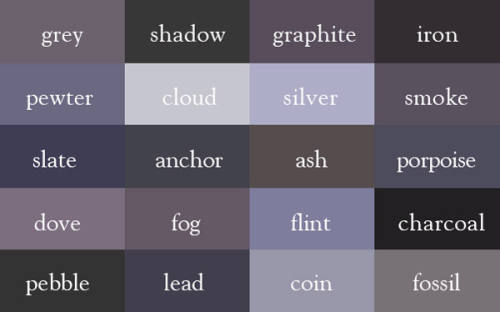
also: dust; stone; pepper;
Black

also: coal; slate; dusky; ebon; shadow; murky;
Tan

also: flesh; khaki; cream; tawny;
Brown

also: henna; russet; sepia; chestnut; cocoa; drab; bronze;
Red

also: terracotta ; rouge; carmine; fire-engine; ruddy
Orange

also: pumpkin ; rust ;
Yellow

also: sunny; amber; saffron; hay; straw; platinum;
Green

also: viridescent; grass; jade; forest;
Blue

also: turquoise; cyan; ultramarine; royal; aqua; aquamarine;
Purple

also: berry; amaranthine;
Pink

also: flushed; candy; cherry blossom; petal pink ;
—– source: http://ingridsundberg.com/
—–additional synonyms added by me
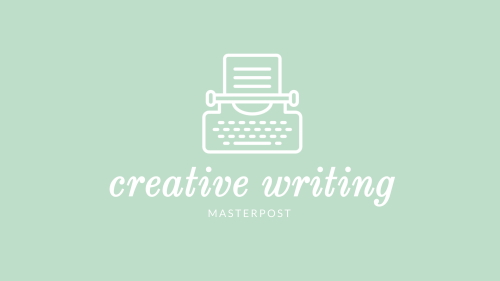
Hey guys! As a writer myself, it’s hard to have a lot of resources for writing in one place. That’s why I decided to create this masterpost, and maybe make more if I find future resources. I hope you like it, and expect to see more masterposts like this in the future!
Generators
Character
Appearance Generator
Archetypes Generator
Character Generator
Character Traits Generator
Family Generator
Job/Occupation Generator, (II)
Love Interest Generator
Motive Generator
Name Generator
Personality Generator, (II)
Quick Character Generator
Super Powers Generator
Names
Brand Name Generator
Medicine Title Generator
Name Generator
Quick Name Generator
Vehicle Generator
Town Name Generator
Plot
First Encounter Generator
First Line Generator, (II)
Plot Generator, (II), (III)
Plot Device Generator
Plot Twist Generator
Quick Plot Generator
Setting/World-Building
City Generator
Fantasy Race Generator
Laws Generator
Pet Generator
Setting Generator
Species Generator
Terrain Generator
Prompts
Subject Generator
”Take Three Nouns” Generator
Word Prompt Generator
Misc
Color Generator
Decision Generator
Dialogue Generator
Journey Generator
Title Generator, (II), (III)
Some Tips
Just a few I found from the writing tips tag!
Writing action / @berrybird
How to create a strong voice in your writing / @collegerefs
How to plot a complex novel in one day! / @lizard-is-writing
8 ways to get past writer’s block / @kiramartinauthor
psa for writers / @dasakuryo
”Write Using Your 5 Senses” / @ambientwriting
How People Watching Improves Your Writing / @wherethetransthingsare
Writing Science Fiction: Tips for Beginners / @fictionwritingtips
Creating Likeable Characters / @authors-haven
Vocabulary
Descriptive words / @somekindofstudent
Words to replace “Said” / @msocasey
Obscure color words / @mintsteelpeachlilac
Words to spice up your stories / @busyibee
Words to describe someone’s voice
Words to Use Instead of Very / @gaybybirth
Touchy Feely Words / @gaybybirth
Some Advice
Stephen King’s Top 20 Rules for Writers
”But my plot isn’t UNIQUE or BIG enough!” / @youreallwrite
8 Things Every Creative Should Know / @adamjk
(How To) Get Over Comparing Yourself to Other Creatives / @adamjk
How to Get Over Common Creative Fears (Maybe) / @adamjk
14 Tips From Stephen King On Writing / @i-can-give-you-prompts
Playlists
Electronic Thoughts / @eruditekid
“Mix About Writing” An Instrumental Mix / @shadowofemirates
Shut Up, I’m Writing! / @ninadropdead
Chill / @endlessreveries
Breathtaking Film Scores / @tweedskirts
Music to Write to Vol. 1: Starlight / @crestadeen
Music for Written Words / @ghoulpatch
Dead Men Tell No Tales / @scamandersnewt
Fatale / @dolcegf
All These Things that I’ve Done / @referenceforwriters
Feeling Soaking into Your Bones / @verylondon
I Can Feel Your Pulse in the Pages / @rphelper
Morally Ambiguous / @scamandersnewt
Wonderwall / @wheelerwrites
Pythia / @mazikeene
Ballet: To Dance / @tanaquil
Websites and Apps
For Writing
ZenPen: A minimalist writing website to keep you free of distractions and in the flow.
The Most Dangerous Writing App: A website where you have to keep typing or all of your writing will be lost. It helps you keep writing…kind of. You can choose between a time or word count limit!
Evernote: An online website where you can take notes and save the product to your laptop and/or smartphone!
Writer, the Internet Typewriter: It’s just you and your writing, and you can save your product on the website if you create an account.
Wordcounter: A website to help check your word and character count, and shows words you’re using frequently.
Monospace: An Android app for writing on the go when you feel the inspiration, but you don’t have your laptop on you!
For Productivity
Tide: An app that combines a pomodoro-esque timer with nature sounds and other noises! (Google Play / Apple Store)
ClearFocus: An Android app with a pomodoro-type time counter to let you concentrate easier and stay productive.
Forest: An app with a time counter to keep you focused and off your phone, and when you complete the time limit, a tree grows in your garden! (Google Play / Apple Store)
SelfControl: A Mac downloadable app that blocks you from distracting mail servers, websites, and other things!
Prompt Blogs
@writeworld
@dialouge-prompts
@oopsprompts
@prompts-for-the-otp
@creativepromptsforwriting
@the-modern-typewriter
@theprofessionalpromptmaker
@writers-are-writers
@otp-imagines-cult
@witterprompts
@havetobememes
@auideas
@putthepromptsonpaper
@promptsonpaper
@fyotpprompts
@otpisms
@soprompt
@otpprompts
@ablockforwritersblock
@awritersnook
Writing Tips Blogs
@writeworld
@anomalously-written
@awritersnook
@clevergirlhelps
@referenceforwriters
@whataboutwriting
@thewritershelpers
@nimblesnotebook
@slitheringink
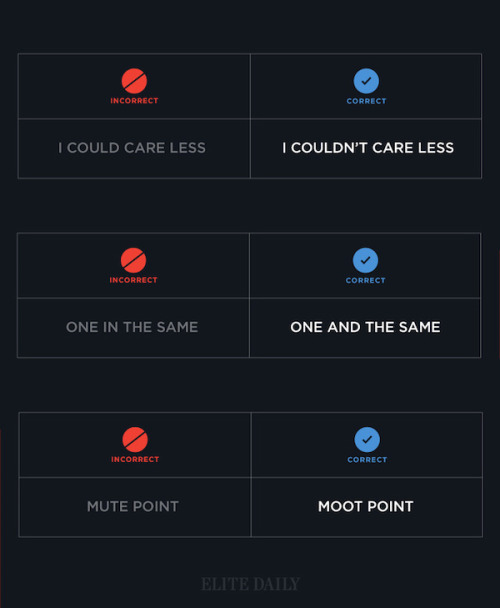


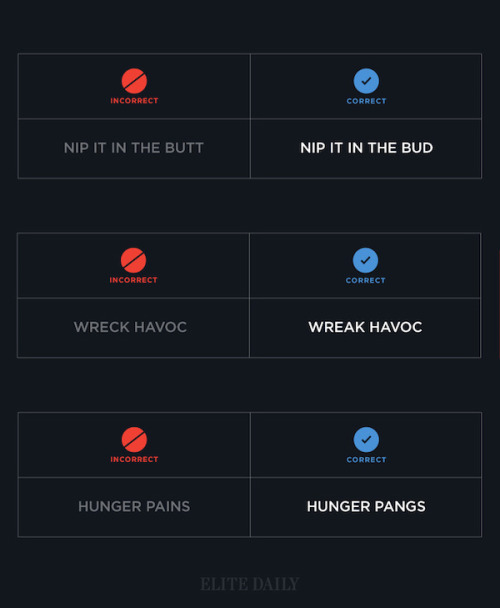
Common Phrases Correctly
To Tired Writers. To the people out there whose hearts very, very much want to write and work on WIPs, but who are just mentally and physically exhausted right now. It’s okay. It is okay to rest sometimes. Allow yourself time to rest.
I got bored and made A Thing.



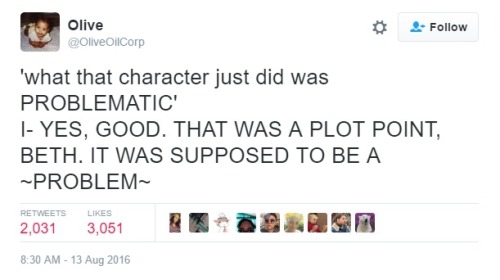
STAR WARS WRITING RESOURCES
PLEASE REBLOG AND ADD ANY OTHERS YOU MIGHT KNOW OF <3 <3
WOOKIEEPEDIA. The source of anything and everything you want to know related to Star Wars. Good for fact-checking, character history, or simply killing time. There is also, of course, the official Star Wars Databank! STAR WARS GALAXY MAP. A fantastic project that maps the Star Wars galaxy as we know it. Consider donating ( if you can! ) to help keep the site up and running! Also check out W.R. van Hage’s map and the Star Wars Atlas Online Companion. TIMELINE. While hosted on Wookieepedia, this is nevertheless deserving of its own bullet point. This page provides an approximate timeline with dates of all canon material. You can also filter items, so that it displays only TV episodes, for example, or only books, or only movies! Find the Legends timeline here. STAR WARS SLANG AND PHRASES. A collection I’ve been keeping of phases, slang, idioms, insults, and more from the Star Wars universe. This also contains a glossary of frequently used terms, such as “refresher” in place of “restroom”. Please feel free to use/share!
STAR WARS NAME GENERATOR. This is a fun one AND a life saver. You can generate up to 100 Star Wars-sounding names ( first and last! ) with a click.
OTHER GENERATORS:
Spaceship names as well as spaceship type/models
Earth-like alien planets for any alien planet you don’t have info on
Random landscapes, see above
Technobabble generator for when you need a reason for a red alert
Alien plant/herb/flower name generator. Also: mineral/metal/gemstone names, material names, medication names, and descriptions of alien substances
Scifi tool names for gadgets and gizmos
OTHER WEBSITES:
Jeff Russell’s Starship Dimensions, Dirk Loechel’s Sci-fi Spaceship Size Comparisons, and other Star Wars Deckplans
Star Wars Post
Star Wars News Net
TheForce.net
I am a(n):
⚪ Male
⚪ Female
🔘 Writer
Looking for
⚪ Boyfriend
⚪ Girlfriend
🔘 An incredibly specific word that I can't remember
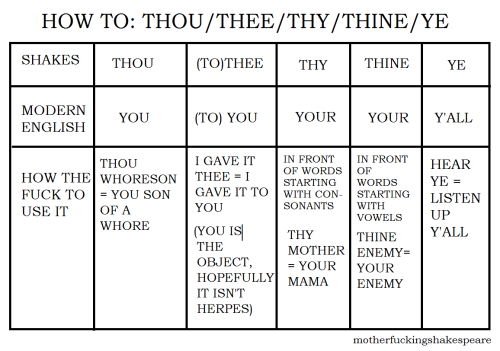
A HANDY CHART FOR THOSE OF YOU WONDERING WHAT THE FUCK IS UP WITH THESE. NOTE THAT THESE ARE ALL THE INFORMAL AND YOU IS THE FORMAL SO LIKE YOU WOULD ALWAYS ADDRESS YOUR SUPERIOR/ OLDER PERSON/ SOCIAL BETTER WITH YOU BUT WITH YOUR BUDS YOU CAN USE THESE.

a quick visual guide to the enemies to lovers trope because a lot of y’all are confused
my dad–also a writer–came to visit, and i mentioned that the best thing to come out of the layoff is that i’m writing again. he asked what i was writing about, and i said what i always do: “oh, just fanfic,” which is code for “let’s not look at this too deeply because i’m basically just making action figures kiss in text form” and “this awkward follow-up question is exactly why i don’t call myself a writer in public.”
he said, “you have to stop doing that.”
“i know, i know,” because it’s even more embarrassing to be embarrassed about writing fanfic, considering how many posts i’ve reblogged in its defense.
but i misunderstood his original question: “fanfic is just the genre. i asked what you’re writing about.”
i did the conversational equivalent of a spinning wheel cursor for at least a minute. i started peeling back the setting and the characters, the fic challenge and the specific episode the story jumps off from, and it was one of those slow-dawning light bulb moments. “i’m writing about loneliness, and who we are in the absence of purpose.”
as, i imagine, are a lot of people right now, who probably also don’t realize they’re writing an existential diary in the guise of getting television characters to fuck.
“that’s what you’re writing. the rest is just how you get there, and how you get it out into the world. was richard iii really about richard the third? would shakespeare have gotten as many people to see it if it wasn’t a story they knew?”
so, my friends: what are you writing about?
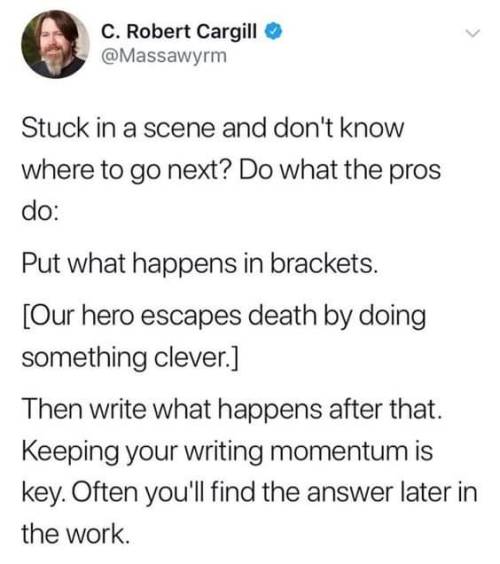

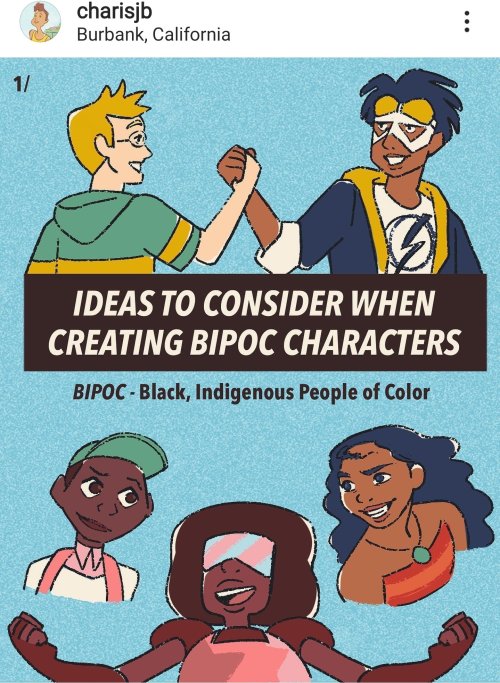
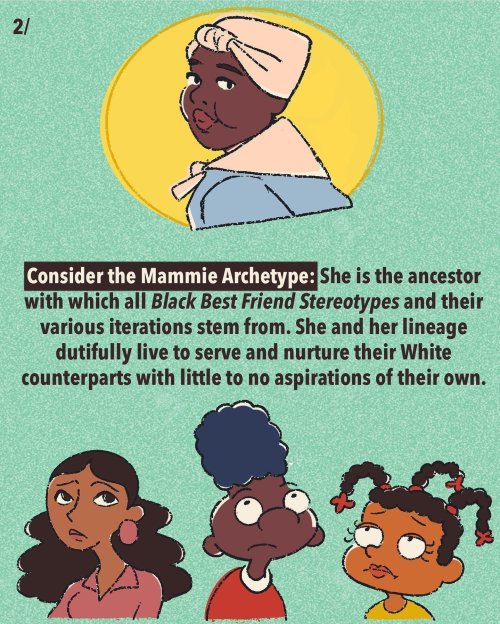
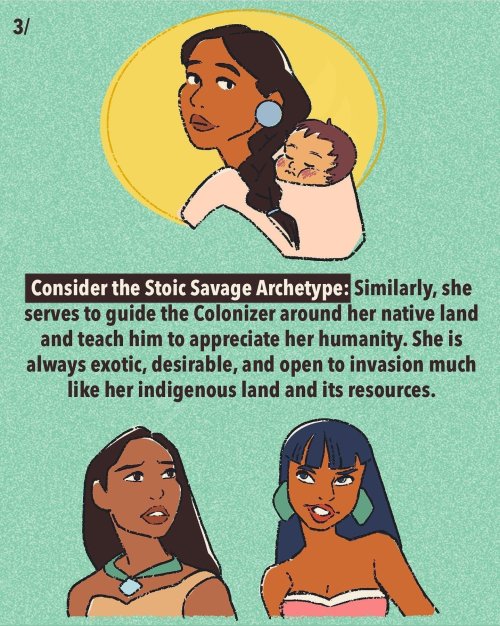
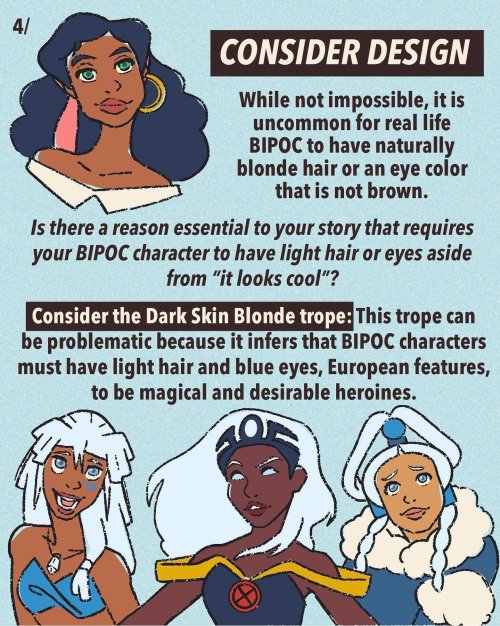
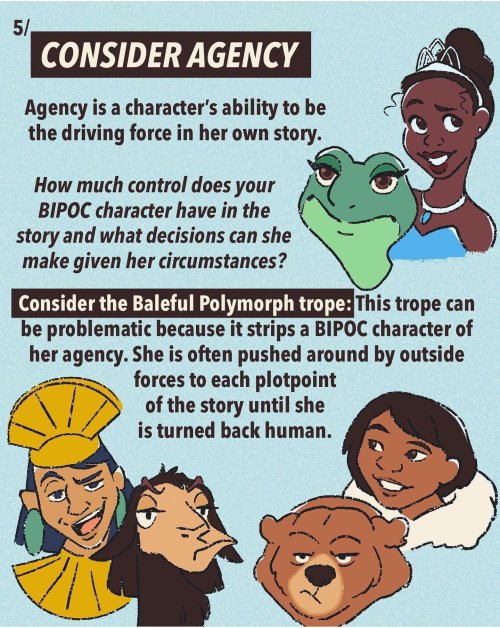

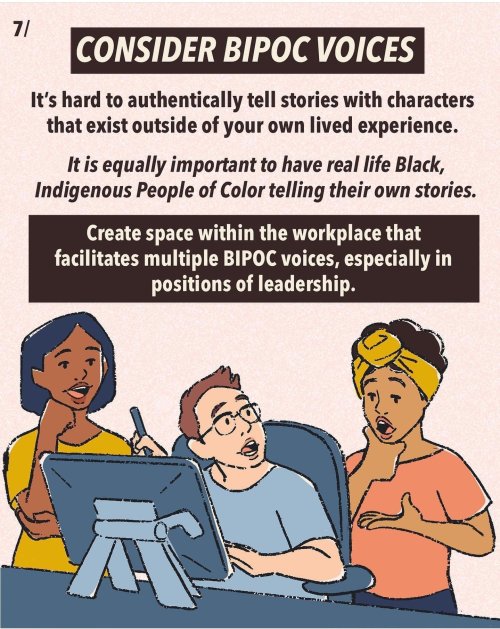
Important ideas to consider when creating characters who are black and indigenous people of color. (x)

this is too much pressure
title???? a TITLE????? is it not enough that i wrote the damn thing IS THAT NOT ENOUGH WORDS WRUNG FROM MY VERY FLESH AND BLOOD
the song lyrics have abandoned me, no number of parantheses and lower cased words can save me from this hell
Dear writers
You’re not a bad person for:
Saying no to requests that make you uncomfortable/you get no inspiration for
Taking a small break every now and then
Changing up your writing style to better suit you
Not posting as often or posting more than other writers
I can’t be the only one that needs a reminder of these things sometimes.
Alternatives for: "Smile"
Okay, so, this turned up a lot like the “said” debate. Some of the alternatives for smile just happen to be for really specific situations, and/or are often misused.
Smile is a great word, and when you try and use an alternative, said alternative often ends up being: a) wrongly used or b) ridiculous sounding. Oftentimes it’s just okay to write “he smiled” or “they smiled at each other” rather than getting “creative” with it.
Not all character development is positive. Characters can, and in my opinion, should, develop both negative and positive traits throughout the course of their story. As the story goes, they shouldn’t be perfected, they’re people, not artpieces, and so there shouldn’t be a stage where they’ve improved/changed exclusively for the better, to the point where they have no negative traits at all.
Emotional Manipulation Starters
Trigger warnings apply. Requested by anon. (Disclaimer: not all of these sentences are manipulative in a different context, and some can be used jokingly as well.)
“If you really cared about me, you’d do what I’m asking.” “Don’t you trust me?” “I wish I never met you, honestly.” “You’re the reason I’m upset.” “It’s all your fault.” “I guess you just don’t love me enough.” “You have to keep it a secret. I’ll find out if you tell anyone.” “Whatever. It’s not like I care.” “I could just leave, you know.” “Do you like them more than me?” “Who have you been talking to?” “I would do anything to make you happy, I just want you to do the same for me.” “You have to tell me. Not telling me is just as bad as lying.” “It would be so easy for me to find someone else.” “If you loved me, you’d tell me.” “It’s like you don’t even care about me.” “One day I’ll be dead and you’ll regret not being there when I needed it.” “Nobody really cares about me, not even you.” “No one will ever love you the way I do.” “If you leave me, I don’t want to even think about what I’ll do.” “I’ll just tell everyone you were abusing me.” “You have to. You owe me.” “I’ve made sacrifices for you, now you have to do the same.” “I’ll never forgive you.” “No, it’s fine. Just do whatever you want, I guess.” “Am I upset? Why, should I be?” “If you don’t come over tonight, I’m going to hurt myself.” “I never said that. You’re trying to confuse me.” “I think you hate me.” “I would do anything for you, so why wouldn’t you do the same?” “If you don’t do this, it’s because you don’t love me.” “You were there for them, but not me?” “Yes, if you love me, you would change for me.” “I’m wasting my time with you.” “Well, I guess I’m just useless, aren’t I?” “I know you didn’t say it, but you were thinking it.” “You hate me. I know you do.” “You can’t convince me I’m not just a burden to you.”
You probably heard this a lot but your writing is so amazing it's literally god tier omg 💖 If you don't mind answering, do you have any writing tips? I really wanna improve my writing and try to be as good as you. (keyword: try)
oh god uh
so here’s a little list of stuff I PERSONALLY do, but please remember everybody writes differently and that’s a GOOD THING so this might not work for everybody
1. Skip around
Sometimes you just get a SCENE, like one specific scene in your head that you want to write. Write it out, and if it doesn’t end up working in the fic, copy and paste it into a different document and keep it, because it’s very possible (and LIKELY) that you’ll use it later in the story. It’s a way of pre-planning if you’re not one of those authors that likes to plan a strict outline at the very beginning, at least you’ll have a general roadmap based off scenes you’re imagining and have already partially written. I have a close friend who works for a publishing company and she always told me to start as close to the end as possible when you’re writing. It’ll not only encourage you to have a fluid, overarching plot line already thought out, but if you put all your effort and energy into writing an impeccable beginning, your story will gradually lose that spark as you go on.
2. Take a solid break between writing and editing
If you can swing it, try not to look at your story for a few days after you’ve finished writing the first draft. If you wait, the words will hit differently and it’ll allow you to edit as if you have a fresh set of eyes. Sometimes that isn’t possible, especially if you’re like me and procrastinate hardcore, but that also leads into my next tip
3. Write when you’re tired, edit when you’re awake
You’d be surprised at how fluidly the words will come when you’re not awake enough to focus on them. Seriously. Writer’s block can hit, and that SUCKS, but I’ve noticed a lot of that can just be due to you being overcritical of your work WHILE you’re writing it. You can totally be a writer AND an editor, but you can’t do both at the same time. It’ll hinder your creativity and stunt your progress, and it’s a hard mindset to escape. That’s why I usually write really late at night, sleep, and then edit the next day.
4. Actually write
This is an important one, kinda self-explanatory. It’s also usually the one people struggle with the most. Writing is hard. It’s HARD. It takes brainpower and determination to do, it doesn’t just come naturally. STORYTELLING is a natural human instinct, coming up with ideas and sharing them with friends, but actually taking the time to write it DOWN and make it COHERENT and COMPLETE is something altogether different. It’s exhausting and sometimes you just don’t want to do it. Do it anyways. Think about the end goal, not the effort it’ll take to get there. Keep writing, keep adding a sentence or paragraph or page every single day, and the more progress you make, the easier it’ll become. Lastly,
5. Set deadlines
This one is a little bit of a catch 22 and I don’t recommend it for everyone. This is only if you struggle with perfectionism and feel like you’ve spent literal MONTHS to YEARS on a single piece of work because it’s just not there yet. If you’ve had a document that you’ve been working on for a long ass time and you haven’t published it, set a deadline for posting. ANNOUNCE the deadline, even if you don’t have many followers who are paying attention. It might be a little anxiety inducing to set a date for yourself without having it finished, but it will force you to drop that perfectionist streak that’s stunting your work and buckle down instead. Again, THIS IS NOT FOR EVERYONE. I just personally was one of those fanfic authors that had 22 unfinished google docs and zero of them published after years of writing. I started setting deadlines for myself, and now I actually get to share my stuff with yall instead of hiding it away and being too critical about it. Deadlines. Deadlines suck, but they encourage productivity in some individuals, and I happen to be one of them.
Try some of these things out, see if they help any!! 🧡🧡